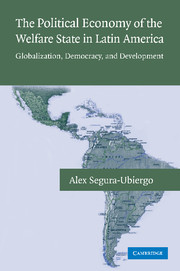 The Political Economy of the Welfare State in Latin America
The Political Economy of the Welfare State in Latin America Book contents
- Frontmatter
- Contents
- Tables and Figures
- Acknowledgments
- 1 Introduction
- 2 The Historical Evolution of Welfare Systems in Latin America: Qualitative Comparative Analysis
- 3 Theoretical Framework and Main Hypotheses
- 4 Determinants of Social Spending in Latin America: A Time-Series Cross-Section Analysis, 1973–2003
- 5 Chile: A Classic Latin American Welfare State under Authoritarian Stress (1973–1989) and Democratic Reinvention (1990–2000)
- 6 Costa Rica: Globalization, Gradual Reform, and the Politics of Compensation, 1973–2002
- 7 Peru: Political Instability, Regime Change, and Late Economic Reform in a Non-Welfare State, 1973–2000
- 8 Conclusion: Summary and Final Reflections on the Sustainability and Effectiveness of Latin American Welfare Systems
- Bibliography
- Index
6 - Costa Rica: Globalization, Gradual Reform, and the Politics of Compensation, 1973–2002
Published online by Cambridge University Press: 10 July 2009
- Frontmatter
- Contents
- Tables and Figures
- Acknowledgments
- 1 Introduction
- 2 The Historical Evolution of Welfare Systems in Latin America: Qualitative Comparative Analysis
- 3 Theoretical Framework and Main Hypotheses
- 4 Determinants of Social Spending in Latin America: A Time-Series Cross-Section Analysis, 1973–2003
- 5 Chile: A Classic Latin American Welfare State under Authoritarian Stress (1973–1989) and Democratic Reinvention (1990–2000)
- 6 Costa Rica: Globalization, Gradual Reform, and the Politics of Compensation, 1973–2002
- 7 Peru: Political Instability, Regime Change, and Late Economic Reform in a Non-Welfare State, 1973–2000
- 8 Conclusion: Summary and Final Reflections on the Sustainability and Effectiveness of Latin American Welfare Systems
- Bibliography
- Index
Summary
This chapter studies the evolution of the Costa Rican welfare system from the early 1970s to the turn of the century. It pays special attention to the process of economic reform and globalization that swept Latin America in the 1980s and its particular impact on the Costa Rican welfare system – one of the most advanced and comprehensive in the region. As with the previous case studies, the purpose of this chapter is to illustrate some of the causal mechanisms underlying the statistical relationships described in Chapters 3 and 4 and to take the analysis of the welfare state beyond the black box of social expenditures.
What makes Costa Rica a particularly interesting case study is that unlike most other countries in Latin America, in the 1980s and 1990s, Costa Rica neither experienced a process of democratization nor a fast and radical program of trade liberalization and market-oriented reform à la Chile. Costa Rica has been continuously democratic for more than fifty years, and economic reforms took place within a context of constant negotiation and broad participation by multiple interest groups, business associations, multilateral organizations, and foreign governments. Furthermore, the case of Costa Rica provides an opportunity to understand the conditions under which the strong relationship between trade openness and reductions in social expenditures (which emerged from the quantitative evidence presented in Chapter 4 and was corroborated by the case of Chile) do not hold.
- Type
- Chapter
- Information
- The Political Economy of the Welfare State in Latin AmericaGlobalization, Democracy, and Development, pp. 207 - 228Publisher: Cambridge University PressPrint publication year: 2007


